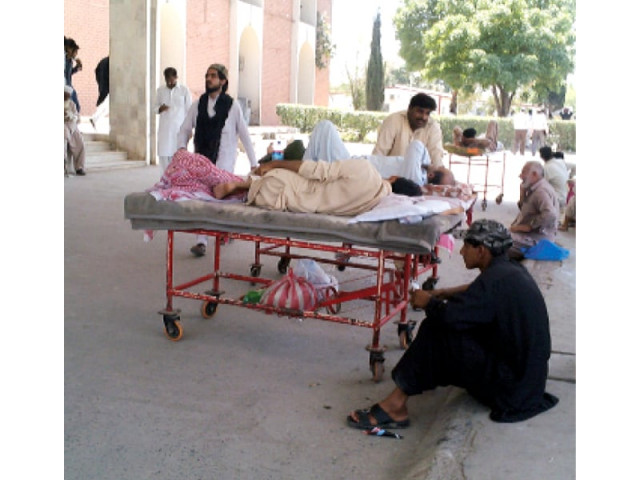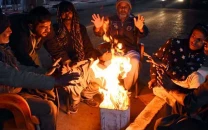Overcrowded: At PIMS, waiting for a bed is a matter of days
Patients on stretchers are common sight at the hospital.

Muhammad Shabbir photographed on Tuesday, has been on this stretcher since Monday afternoon. Less serious cases can be seen outside. PHOTO: SEHRISH WASIF/EXPRESS
Iqbal, 65, who suffered a brain haemorrhage, had to wait 36 hours for a bed at the largest public-sector referral hospital of the country. Most wards at the Pakistan Institute of Medical Sciences (Pims), are overcrowded, with patients sharing beds, while others lie on stretchers waiting for a doctor to attend to them out of kindness.
“He is on his deathbed with a brain haemorrhage but no one at the hospital seems to be bothered about his condition,” said the patient’s attendant Mehtab, who hails from Pagwari, Murree.
Even the doctors checking up on patients in wards do not consider it their duty to tend to patients lying on stretchers, he stated. “They attended to him only after informing me that they were not responsible for patients lying on stretchers,” he claimed. He said in case of a shortage of beds, the hospital administration should make arrangements to facilitate patients who are on deathbed.
Ghulam Shabbir, 60, was lying on a stretcher in a narrow passage. “He suffered a paralysis last night and we brought him to Pims but since then he has been lying on a stretcher waiting for a bed,” said Ashraf Hussain, one of his attendants.
Due to shortage of space, we could not find a suitable place to place the stretcher, he stated. “This passage is narrow and it has become difficult for us to even stand and look after him,” he said.
The sudden rise in the mercury has also added to their woes as patients and their attendants claim they nearly suffocate due to the lack of air-conditioning at the hospital.
Shahid Hussain, an attendant of another patient admitted in Medical Ward 4 said, “It seems like he is in an oven; it has become difficult for him to even breathe.”
The reason the hospital is in such a pathetic condition is because it provides healthcare services to poor people, he added. “If rich patients came to this hospital, I am sure its condition would improve within a day.”
Hussain said his relative was sharing a bed with someone suffering from a chest infection. He keeps coughing and spitting all night, he added. “At night there is hardly any sweeper available to clean up the mess in the ward and we have to wait till morning to get rid of all this pungent smell caused by the smell of perspiration, medicines and food.”
Amna Bibi, an attendant accompanying Baqir Ali said, “Even outside the hospital’s building there is no shade where we can spend some time to escape the pathetic environment.” Most of the time one can see flies and mosquitoes inside the ward carrying germs from one patient to another, she added.
A senior doctor requesting anonymity said the hospital’s environment violated international standards. “The unhygienic environment can make patients more ill as they are at risk of contracting hospital-acquired infections.” The majority of patients who share beds are prone to acquiring communicable disease from each other. Their attendants’ health is also at risk, he added.
Shaheed Zulfikar Ali Bhutto Medical University (SZABMU) Vice-Chancellor Dr Javed Akram said the shortage of beds was a major issue but the hospital administration could not resolve it because it was already providing treatment to patients beyond its capacity.
“The entire hospital needs a proper cooling system. The chillers were installed in the mid-80s when the hospital was established and the majority of them are non-functional.” We’ve floated a tender for three chillers and hopefully we will get them soon, he added.
Published in The Express Tribune, April 30th, 2014.



















COMMENTS
Comments are moderated and generally will be posted if they are on-topic and not abusive.
For more information, please see our Comments FAQ